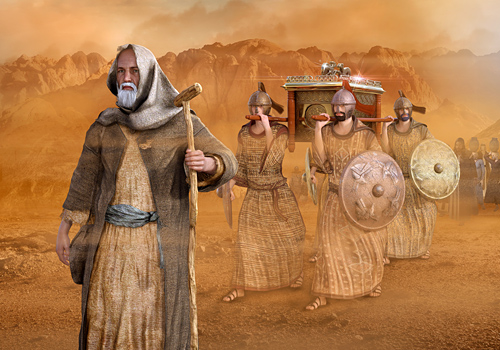Introduction to the Books of 1 and 2 Samuel
This page is an introduction and summary for the books of 1 & 2 Samuel in the Christian Bible. (1 & 2 Samuel are also in the Jewish Bible, but I'll be covering them from a Christian perspective).
I'm doing several new pages on the first five books of the Bible (the books of Moses, also called the Pentateuch), and the "former prophets" which are the books of Joshua, Judges, 1 & 2 Samuel and 1 & 2 Kings.
I'll be working on these new pages in parallel as I study for my Old Testament exam on the 10th of June, and adding to them as I study. I figured I might as well be writing my study notes up online as web pages, since now that this website is set up, it's not that much harder than just doing them in a Word document (or something like that).
Introduction to 1 & 2 Samuel
The books of 1 & 2 Samuel follow on from the books of Joshua and then Judges. Their name in the Hebrew Bible is just "Samuel", the same as the English name.
At the start of the 1 Kings, Israel has no human king (the Lord their God is meant to be their king, yet the people don't think this is adequate, and want a human king like the nations around them). The books of 1 and 2 Samuel tell the story of Israel getting their first king (Saul), and then the rest of 1 and 2 Samuel is about King David.
Before Reading or Studying Samuel
Before reading or studying the Bible, it's a good idea to take a short break — to think about where the book of Samuel came from, and how it's relevant to your own modern life right now. Christians believe that the Bible is the inspired Word of God. That is, the words in Samuel were recorded by people in the distant past, as given to them by God.
Also, the Bible is a living document — it's the living word of God. This is a foreign concept to most of our modern culture today, so it takes some time to think about, and get used to the idea of it. Many people think of God as not speaking directly to us. Yet as Christians, God does speak to us directly, in words — and the way God does this is through his words in the Bible. This means that it's directly relevant to us, personally, as we read it. As you read the words of Samuel (even if you don't really believe in this kind of stuff yet, you can still try doing this, as an experiment), imagine that God is speaking to you, personally, and directly.
Also, the Bible is an ancient document. It's very old — and the first few books of the Old Testament, especially so. A lot of things have changed since God's words were first recorded by humans. This means a lot of the Bible can be hard to understand in our modern world today. Which is why we're so lucky to have so much access to resources that can help us to understand it. As you read the words of Samuel, also imagine that you're back then, in the days when it was written. This can help a lot with understanding the meaning (of some parts of the Bible more so than others). Learning about what the words meant in their original setting is a really good place to begin trying to understand what they mean now. Keep this idea in mind as you read the rest of this web page, and as you read the Bible.
Also, the Bible is a precious document. Its true value is hard to imagine. It's probably fair to say that nearly everyone today underestimates its value — at least in the free and well-off countries, where it's very easy (and cheap) for anyone to obtain a copy of the Bible, or read it on the internet. To help get a better appreciation for the value of the Bible, think about how God's word has travelled down through the centuries, and been preserved by copyists, translators, printers, and other people. At times parts of it were lost, and then found again. In recent years, thousands of ancient copies of scrolls have been found, which were meticulously copied by hand over and over, for thousands of years. In some places and at some times, to own a copy of the Bible (or even to believe in it) would bring the death penalty. This included many of those who wrote parts of it, or were written about in it (such as the Apostles of Jesus).
Interesting Facts about 1 and 2 Samuel
- Like every Bible book, when you read it, think "What does this tell me about the nature of God?". This way it will have more relevance and meaning. Also think "What is God trying to tell us, the readers of this story?"
- These books were written for the future generations of Israelites, and, by extension, to all the peoples of the world (as God mentions in several places in the Bible that his love and promises are to be extended to all the nations).
- The book begins with the story of Hannah, mother of Samuel. Samuel is a judge (in the sense of the judges in the Bible book of Judges, which is more like a ruler than the modern idea of a judge), a priest, and a prophet.
- Samuel annoints Saul as the first King of Israel, and then becomes a royal advisor/consultant to King Saul. Samuel annoints Saul as king because his own sons were corrupt and not considered worthy of being king.
- God is meant to be the king of Israel, yet the people are not satisfied with this and want a worldly king. Samuel warns them that this will lead to many problems (which he lists out in detail), yet the people of Israel still ask him for a human king. Samuel asks God what to do, and God says to give the people what they want, a human king, and that (most of) the people have rejected their God ever since God rescued them from slavery in Egypt, so this is no surprise that they're still rejecting God.
- After Saul, the next king is King David.
- King David is given a lot of writing space, more than any of the other kings (including Saul, and those kings mentioned in 1 and 2 Kings). David also wrote many (or most) of the Psalms in the book of Psalms.
- David is seen as the model king, even though he has many flaws, and commits many sins, showing his human-ness.
- These flaws, among other things, point out the need for a future, perfect king, which we now have in the risen Lord Jesus Christ.
- Jesus was a descendant of David.
- Jesus is the fulfillment of God's promise that a descendent of David would eventually rule forever.
Read 1 & 2 Samuel
Click here to read the book of 1 Samuel, or the book of 2 Samuel.
Click here to see 1 Samuel or 2 Samuel in their original language of Ancient Hebrew. Or here to read 1 Samuel or 2 Samuel in Hebrew and English side-by-side.








